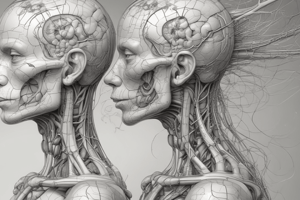Podcast
Questions and Answers
How does the brain respond when you touch a hot stove?
How does the brain respond when you touch a hot stove?
The brain sends a message to move your hand to prevent burning.
What role do the lungs play in the human body?
What role do the lungs play in the human body?
The lungs help you breathe by taking in oxygen and removing carbon dioxide.
What is the function of the heart in the circulatory system?
What is the function of the heart in the circulatory system?
The heart pumps blood throughout the body to deliver oxygen and nutrients.
Can you explain how blood travels through the body?
Can you explain how blood travels through the body?
Why is the human body often compared to a machine?
Why is the human body often compared to a machine?
ما هو اسم الأنبوب الذي ينقل الطعام من الفم إلى المعدة؟
ما هو اسم الأنبوب الذي ينقل الطعام من الفم إلى المعدة؟
كم يبلغ طول المريء عند البالغين تقريباً؟
كم يبلغ طول المريء عند البالغين تقريباً؟
ما كمية اللعاب التي يمكن أن ينتجها الجسم في اليوم الواحد؟
ما كمية اللعاب التي يمكن أن ينتجها الجسم في اليوم الواحد؟
ما هو الدور الذي يلعبه اللعاب في عملية الهضم؟
ما هو الدور الذي يلعبه اللعاب في عملية الهضم؟
ما هو الجهاز الذي يسمح للأطباء برؤية داخل الجسم عن طريق بلعه؟
ما هو الجهاز الذي يسمح للأطباء برؤية داخل الجسم عن طريق بلعه؟
Flashcards are hidden until you start studying
Study Notes
Overview of the Human Body
- The human body functions as a complex machine with various parts working in harmony.
- Key activities such as seeing, thinking, feeling, and moving are coordinated by the body's systems.
Role of the Brain
- The brain acts as the central control station of the body.
- Sends messages for essential functions: thinking, feeling, and movement.
- Example of functionality: Touching a hot stove triggers an immediate response to withdraw the hand.
Function of Lungs
- Lungs are located in the chest and are crucial for breathing.
- Inhale oxygen from the air which is then transported via the bloodstream.
- Lungs also filter out carbon dioxide, a waste product of respiration.
Heart Functionality
- The heart is classified as a muscle and serves as the body’s pump.
- Pumps blood throughout the body, ensuring circulation.
- Blood carries oxygen and vital nutrients to all body parts.
Circulatory System
- Blood circulates through the body using arteries and veins.
- Arteries transport oxygen-rich blood from the heart, while veins carry deoxygenated blood back to the heart.
- All organs work collaboratively to sustain life and maintain bodily functions.
Digestive System Overview
- The digestive system processes food to provide essential nutrients for bodily functions.
- Food undergoes a transformation starting from the mouth until it reaches the stomach.
Mouth and Saliva
- Chewing breaks food into smaller, manageable pieces.
- Saliva aids in softening food, making it easier to swallow.
- An adult produces approximately 1.5 liters of saliva daily.
Oesophagus Functionality
- After chewing, food travels through the oesophagus, a muscular tube approximately 25 cm long.
- Coordinated muscle contractions (peristalsis) move food toward the stomach, effectively functioning even in upside-down positions.
Food Consumption Facts
- An average adult consumes around 500 kg of food annually.
Medical Technology
- The Pill Cam is a miniaturized camera that can be swallowed to capture internal images, taking up to 55,000 pictures over an 8-hour period.
- This innovation has been in use since 2001 to facilitate non-invasive internal examinations by doctors.
Studying That Suits You
Use AI to generate personalized quizzes and flashcards to suit your learning preferences.




